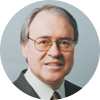When the grandfather clock struck 10 a.m., the chime reverberated powerfully around the lawyer's office, making the tall clock the focal point of attention. Yet the small group gathered there seemed to ignore it, with no outward behavior that anyone was paying attention to this time notification.
Dr. Poston was 84 when he died; his first wife, Linda, had passed away about three years earlier. Many would agree that Al became quite depressed after her passing. He had retired when he was 71 and the two had traveled, played golf and generally enjoyed life until her untimely death from lymphoma. Then, in less than one year, Al remarried. His new bride, Tammy, a former patient, was a woman 18 years younger than himself.
Al Poston had been a successful DC in the medium-sized city in which the family had lived for more than 60 years. He loved singing in a barbershop quartet and led the Shriners "funny car" group for charity parades. His active involvement in their community and intense immersion in his profession influenced his children. Vicki was the oldest, now 59, a chiropractor herself, married for many years, and thinking about her own retirement someday. Although Al had not been especially "close" with his grown children, Vicki was the one to react to his death with the most sorrow and emotion. Next oldest was Frank, age 56, also a DC, divorced, but now married to Gloria. Vicki considered Gloria to be a "gold digger,"and consequently had never tried to be more than cordial with her.
Margaret, "Maggie," age 53, was the third oldest child, never married, and ended up being the one to take care of their mother during the last year of her life. Always smiling and thoughtful, introverted, but quick to recognize family stress, she had always been the "peacemaker."
But Albert did not make his fortune from his practice; it was from oil and gas. He had wisely maintained the mineral rights in the Oklahoma family farm after his parents passed. One day, the oil drill "struck it rich" and royalties produced money ... a lot of money. The kids had never seriously discussed the topic of money with their parents, and now all three of them regretted it. They could only imagine what was in this will.
The Poston's attorney, Edwin Kellogg, slowly unfolded the document. "Your father made a wise move in his final years" he said. "He took the time and resources to devise a trust ... the Poston Family Trust. I think you will be relieved that most of your hopes and fears will be answered in a positive way in this will." And they were. All three children were treated fairly. Al's new wife Tammy had signed a prenuptial agreement and was satisfied. The estate was secure, burial arrangements were clear, and certain personal items were willed to each child in a thoughtful way.
The purpose of this story was to make you anticipate problems coming for the Poston family, with chaotic dissention the most probable outcome. It didn't happen because Al and Linda Poston had the maturity to truly provide for the family after their passing.
Kate Ashford, a financial columnist for Forbes, has stated that 63 percent of us have no will and approximately one in 10 wills are out-of-date.1 When asked why they don't have a will, Ann Brenoff of The Huffington Post reported that 60 percent of people say they "haven't got around to it."2
Bad things can happen without a will. In some states, the present wife, even if she is the fourth wife, will get everything and the grown kids will get nothing. Without a will, parents or estranged siblings may get everything. As Brenoff predicts, "Expect a big fight among the family, and it will be stupidly expensive!"
Chiropractic magazines and newsletters often have articles written by distinguished financial planners or counselors. We doctors need to read those articles, especially the ones that encourage us to skip the squabbles and write a will or develop a legal trust. I did, and now have one less thing to worry about.
References
- Ashford K. "Horror Stories: When You Die Without a Will." Forbes, June 30, 2016.
- Brenoff A. "7 Nasty Things That Can Happen If You Die Without a Will." Huffington Post, May 13, 2016.
Click here for more information about John Hanks, DC.





